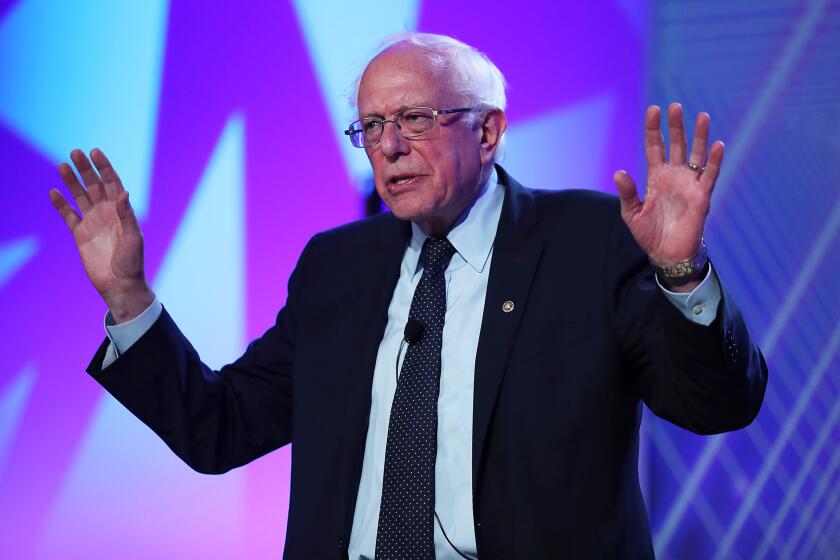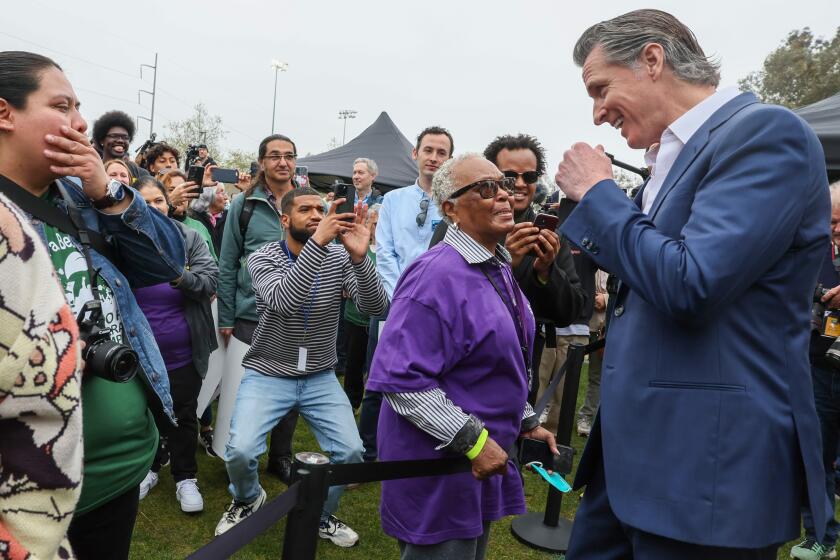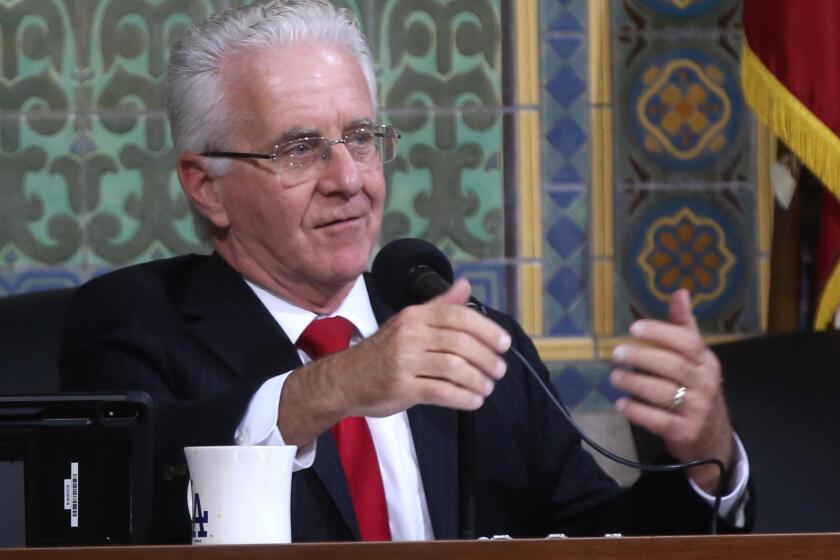Open Primary’s Impact Big, but Unpredictable
By approving the open primary measure on Tuesday’s ballot, California voters continued their seemingly never-ending quest to fix the political system through citizen initiatives.
A few years ago, the voters used direct democracy to impose term limits on legislators. In November, there will be one and perhaps two initiatives to limit campaign spending.
By passing Proposition 198, voters added open primaries to the list of political reforms. It could be among the most significant changes of them all. The question is: How will those changes play out?
“I don’t think the public understood how dramatic a change this will make,” said political analyst Tony Quinn.
Unless Proposition 198 is overturned by a legal challenge, voters starting in 1998 will receive primary ballots listing the names of candidates in every party. They will be able to cast their ballots for the one candidate of their choice, regardless of their own party registration.
In effect, Democrats can have a say in choosing Republican candidates and vice versa. Each party’s top vote-getter will face off in the November general election.
Backers of Proposition 198 say that with 11% of California’s electorate registered as independents, and with minor party membership rising, allowing these unaligned voters to help choose the major parties’ candidates will dilute the strength of the far left and right and make California politics more moderate.
If the moderates’ vision turns out to be true, open primaries could have a particularly strong impact on the state Assembly races, where as many as 70 of the 80 seats are considered safe for Republicans or Democrats. Under the new system, minority party members will have the chance to make a difference in the primary, open primary backers say.
Secretary of State Bill Jones, for one, believes the change could increase primary election turnout by giving independents a chance to make a difference in major party nominees.
“I’m not afraid of it,” Jones said Wednesday. “The people have spoken and we have to figure out how to make it work.”
But even as proponents contemplated a new era of nonpartisan debate in Sacramento, some political consultants were thinking about the mischief Proposition 198 may bring.
“Like any other interesting concept, it is only in its application that its brilliance or its stupidity becomes apparent,” said Gail Kauffman, a Democratic political consultant.
“In a disciplined arena,” Kauffman added, “where Democrats or Republicans pick their shots carefully, either side devoting some serious money to playing in each other’s primary will have a devastating effect. You will never see it coming. Sneak attacks will go up tremendously.”
Political gamesmanship already is common. In this primary, Senate Republican Leader Rob Hurtt of Garden Grove gave $40,000 to Assemblyman Curtis Tucker Jr. (D-Inglewood), thinking that if Tucker had won his Senate race, it might have helped Hurtt’s climb to become leader of the Senate.
Democrats do it, too. State Sen. Patrick Johnston (D-Stockton) sent a mailer to Republicans saying that the strongest Republican challenger in his district owed back taxes. That candidate lost, and now Johnston will face a candidate perceived as being weaker in November.
And there was the indictment of Assemblyman Scott Baugh (R-Newport Beach) and guilty pleas of three campaign workers stemming from a scheme last year to place a Democratic ringer candidate on the ballot.
Some critics of Proposition 198 warn that voters in one party may cross over to try to nominate extremists or weak candidates in the other party, hoping to gain advantage in the general election. Others point to David Duke, the onetime Ku Klux Klansman, who was chosen as the Republican nominee for governor in 1991 in Louisiana, which has open primaries.
Several major states have same-day registration, a variation of the open primary concept. But only three states, Washington, Alaska and Louisiana, have Proposition 198-type systems.
Republican and Democratic leaders, who adamantly opposed the measure, probably will challenge it in court before the next primary.
“I know it will be thrown out,” said Bob Mulholland of the Democratic Party, in a comment echoed by John Herrington, chairman of the state GOP.
One focus of the challenge would be the claim that each party’s voters have a right to decide who represents them in general elections. In 1986, the U.S. Supreme Court, acting in a Connecticut case, ruled that parties are not required to open primaries to all voters.
Mulholland said that Democrats also will challenge the measure because it conflicts with national party rules. Those rules state that only Democrats may vote in primaries for Democratic presidential candidates, raising the possibility that if Proposition 198 is upheld the party may have to select convention delegates from California by caucus.
Last week, however, the Alaska Supreme Court affirmed that state’s open primary system, concluding that the state’s interest in giving voters more candidates to select from outweighed a GOP desire to restrict the nomination process.
“I would hope the lesson to the parties is that they are not in touch,” said Rep. Tom Campbell (R-Stanford), one of the measure’s major backers. “They better learn to get in touch, instead of spending money trying to overturn the will of the voters.”
Moderates, particularly in the Republican Party, have been pushing for open primaries since at least 1972, feeling it would give them more clout by hurting the election chances of strongly ideological candidates. They tried to place such an initiative on the ballot in 1976, but failed to gather enough signatures.
After Campbell lost the GOP primary for U.S. Senate in 1992 to conservative Bruce Herschensohn, Susan Riegel Harding, 55, a San Diego stockbroker who has been working on the open primary idea for almost 20 years, visited him and pitched the idea.
Campbell seized on it. For money, he turned to one of his early supporters, David Packard, co-founder of Hewlett-Packard Co. Packard, who died on election day, donated $200,000 for the signature-gathering drive and gave another $100,000 during the campaign.
Campbell, who served a term in the state Senate before being elected to Congress last year, came away from the state Capitol concluding that many elected officials in both parties have extreme views.
“They would not fit in well in a party at your home watching the Final Four,” Campbell said.
Herrington agreed, but does not particularly view moderation as a plus. In states with open primaries, he said, candidates “don’t stand for very much. You get a lot of mush.”
“All candidates play to the center. Nobody says anything different,” Herrington said.
The system scrapped on Tuesday had been in place since 1959. Before that, California had a primary system that permitted cross-filing, in which candidates routinely appeared on ballots as both Democrats and Republicans.
Cross-filing dated to the early 20th century Progressive Era, and was aimed at weakening the power of parties. In practice, it meant that Republicans maintained control of the Legislature in the 1940s and 1950s, even though Democrats had made major registration gains, political analyst Quinn said.
Democrats ended cross-filing after Edmund G. “Pat” Brown Sr. was elected governor in 1958 and Democrats gained control of the Legislature.
Changes such as the open primary almost without exception come about through initiative, itself an attempt at political reform and probably the most fundamental change that came from the Progressive Era of Hiram Johnson.
But Tuesday’s returns affirmed some basic truths about initiatives. Although Californians embrace their right to participate in direct democracy, they historically have voted down two-thirds of all initiatives.
Other than the open primary, no citizen-generated initiative won on Tuesday. All three measures to limit litigation failed, as did one to repeal rent control in mobile home parks. The other measures were placed on the ballot by the Legislature.
“The initiative process is hallowed ground for most Californians,” said former California Secretary of State Tony Miller. “Even though voters may be skeptical and get tired of lengthy ballot arguments, they want the opportunity to decide.”
As Californians were turning down four of five citizen-generated initiatives on Tuesday, an estimated 2,000 signature gatherers positioned themselves outside polling places across the state to place a new batch of measures on the November ballot.
Mike Arno, of American Petition Consultants, said his troops gathered more than 100,000 signatures for new initiatives on Tuesday.
In addition to the anti-affirmative action initiative that already has qualified for the November ballot, there will be at least one campaign finance reform measure, perhaps a gambling initiative, one to deny uninsured motorists the right to sue over car accidents, and one to boost the minimum wage.
And after beating all three initiatives aimed at them, trial lawyers have an initiative on the November ballot to protect their fees, and probably will qualify a second measure to make it easier to bring securities litigation in state court. Backers of the litigation measures will counter with another on the November ballot.
“The campaign continues,” said Bill Zimmerman, who managed the campaign for the failed anti-litigation initiatives. “The permanent campaign.”
(BEGIN TEXT OF INFOBOX / INFOGRAPHIC)
THE TIMES POLL
Profile of the California Primary Electorate
This exit poll by The Times profiles various groups of primary voters and Republican primary voters. How these groups divided their votes among the ballot choices helps to explain why some propositions won while others lost and how Sen. Bob Dole amassed his landslide margin of victory. For example, even very conservative Republican voters awarded Dole 59% of their votes while giving only 29% to Patrick J. Buchanan.
These tables--reading across--show the percentage of voters in each group listed at left who voted for:
REPUBLICAN CANDIDATES
(Among Republican voters)
*--*
% of % of all GOP ALL Bob Patrick Other Voters Voters Dole Buchanan Candidates SEX Male 51% 52% 62% 22 16 Female 49 48 69 15 16 AGE 18-29 11% 10% 58% 23 19 30-44 42 37 65 19 16 45-64 31 34 66 17 17 65 or over 16 19 70 19 11 RACE/ETHNIC BACKGROUND White (Non-Latino) 84% 82% 65% 20 15 Minorities 16 18 72 12 16 EDUCATION High school grad. or less 17% 19% 70% 23 7 Some college 31 27 61 21 18 College graduate 27 26 68 18 14 Postgraduate studies 25 28 66 14 20 POLITICAL IDEOLOGY Liberal 12% 30% 75% 13 12 Middle-of-the-road 27 28 63 17 20 Somewhat convervative 41 28 68 16 16 Very conservative 20 14 59 29 12 PARTY IDENTIFICATION* Democrat 7% 40% 50% 9 41 Independent 17 16 48 24 28 Republican 76 44 69 18 13 INCOME Less than $20,000 8% 10% 54% 33 13 $20,000 to $39,999 23 25 66 17 17 $40,000 to $59,999 24 22 64 20 16 $60,000 to $74,999 15 14 64 19 17 $75,000 or more 30 29 71 16 13 RELIGION Protestant 58% 48% 65% 20 15 Catholic 22 24 66 19 15 Other religions 8 11 71 11 18 Don’t practice any religion 12 17 67 13 20
*--*
- WHICH OF THESE APPLY TO YOU?
(Multiple responses accepted)
*--*
% of % of all GOP ALL Bob Patrick Other Voters Voters Dole Buchanan Candidates Homeowner 65% 65% 69% 17 14 Married 63 61 68 17 15 Unmarried 25 27 59 20 21 Self-employed or Business owner 21 20 62 19 19 White-collar worker 35 34 65 17 18 Blue-collar worker 11 12 56 28 16 Born-again or evangelical Christian 18 13 54 26 20 Gun owner 26 22 63 22 15
*--*
These tables--reading across--show the percentage of voters in each group listed at left who voted for:
BALLOT PROPOSITIONS
(Among all voters)
*--*
SEX Male 51% 52% 58% 42 42% 58 47% 53 53% Female 49 48 64 36 31 69 39 61 44 AGE 18-29 11% 10 60% 40 37% 63 41% 59 49% 30-44 42 37 65 35 32 68 43 57 49 45-64 31 34 61 39 44 56 46 54 51 65 or over 16 19 52 48 37 63 41 59 46 RACE/ETHNIC BACKGROUND White (Non-Latino) 84% 82% 60% 40 38% 62 44% 56 50% Minorities 16 18 63 37 33 67 40 60 43 EDUCATION High school grad. or less 17% 19% 63% 37 33% 67 38% 62 46% Some college 31 27 66 34 39 61 45 55 53 College graduate 27 26 61 39 40 60 48 52 51 Postgraduate studies 25 28 54 46 36 64 41 59 44 POLITICAL IDEOLOGY Liberal 12% 30% 58% 42 30% 70 32% 68 36% Middle-of-the-road 27 28 68 32 31 69 38 62 44 Somewhat convervative 41 28 58 42 45 55 54 46 62 Very conservative 20 14 51 49 53 47 60 40 64 PARTY IDENTIFICATION* Democrat 7% 40% 61% 39 26% 74 30% 70 36% Independent 17 16 69 31 39 61 47 53 51 Republican 76 44 57 43 48 52 56 44 61 INCOME Less than $20,000 8% 10% 63% 37 33% 67 35% 65 41% $20,000 to $39,999 23 25 61 39 32 68 39 61 45 $40,000 to $59,999 24 22 64 36 37 63 44 56 50 $60,000 to $74,999 15 14 58 42 41 59 47 53 52 $75,000 or more 30 29 58 42 42 58 48 52 51 RELIGION Protestant 58% 48% 61% 39 39% 61 46% 54 53% Catholic 22 24 62 38 38 62 45 55 49 Other religions 8 11 62 38 29 71 34 66 41 Don’t practice any religion 12 17 56 44 39 61 41 59 45
SEX Male 47 Female 56 AGE 18-29 51 30-44 51 45-64 49 65 or over 54 RACE/ETHNIC BACKGROUND White (Non-Latino) 50 Minorities 57 EDUCATION High school grad. or less 54 Some college 47 College graduate 49 Postgraduate studies 56 POLITICAL IDEOLOGY Liberal 64 Middle-of-the-road 56 Somewhat convervative 38 Very conservative 36 PARTY IDENTIFICATION* Democrat 64 Independent 49 Republican 39 INCOME Less than $20,000 59 $20,000 to $39,999 55 $40,000 to $59,999 50 $60,000 to $74,999 48 $75,000 or more 49 RELIGION Protestant 47 Catholic 51 Other religions 59 Don’t practice any religion 55
*--*
- WHICH OF THESE APPLY TO YOU?
(Multiple responses accepted)
*--*
% of % of all GOP ALL 198 200 201 2 Voters Voters Yes No Yes No Yes No Yes Homeowner 65% 65% 60% 40 38% 62 45% 55 50% Married 63 61 60 40 40 60 47 53 52 Unmarried 25 27 60 40 34 66 39 61 45 Self-employed or Business owner 21 20 62 38 41 59 47 53 51 White-collar worker 35 34 60 40 36 64 46 54 49 Blue-collar worker 11 12 65 35 35 65 39 61 45 Born-again or evangelical Christian 18 13 56 44 38 62 46 54 54 Gun owner 26 22 60 40 45 55 48 52 56
02 No Homeowner 50 Married 48 Unmarried 55 Self-employed or Business owner 49 White-collar worker 51 Blue-collar worker 55 Born-again or evangelical Christian 46 Gun owner 44
*--*
Note: Numbers in the vertical columns above may not add up to 100% where more than one response was accepted or not all voter groups are shown.
* Voters were asked which party they identified with, regardless of their registration.
Source: Los Angeles Times exit poll conducted March 26
HOW THE POLL WAS CONDUCTED: The Los Angeles Times Poll interviewed 3,469 primary voters, including 1,816 GOP primary voters, who cast ballots in the California primary as they exited 60 polling places across the state. Precincts were chosen based on the pattern of turnout in past primary elections. The survey was a self-administered, confidential questionnaire. The margin of sampling error for all primary voters and Republican primary voters is plus or minus 3 percentage points. For some subgroups the error margin may be somewhat higher. Fieldwork for this survey was conducted by Davis Research.
More Coverage of Local Elections
* GRUDGE MATCH: Tuesday’s primary touched off partisan battles for control of the state Assembly and Senate. A3
* INCUMBENTS PREVAIL: There were few surprises in the state’s congressional races. A3
* ANGRY ELECTORATE: Dist. Atty. Gil Garcetti blamed his showing on voters’ anger. B1
* HEATED RACE: A hotly contested race is shaping up for county supervisor. B1
* ELECTION TABLES: A16-A19
More to Read
Get the L.A. Times Politics newsletter
Deeply reported insights into legislation, politics and policy from Sacramento, Washington and beyond. In your inbox three times per week.
You may occasionally receive promotional content from the Los Angeles Times.






